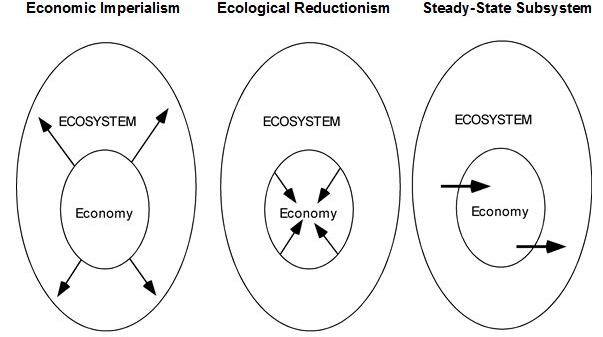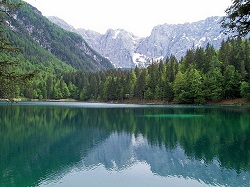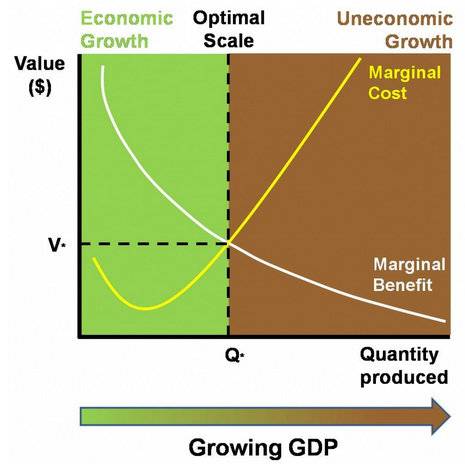
|
Mother Pelican
A Journal of Solidarity and Sustainability
Vol. 10, No. 7, July 2014
Luis T. Gutiérrez, Editor
|
|
|
|

|
|
|
Integrating Ecology and Economics
Herman Daly
Center for the Advancement of the Steady State Economy
This article was originally published in
The Daly News, 5 June 2014
under a Creative Commons License
The Center for the Advancement of the Steady State Economy (CASSE) is a research group on economic sustainability located in Arlington, Virginia, USA. The mission of CASSE is "to advance the steady state economy, with stabilized population and consumption, as a policy goal with widespread public support."
|
|
Attempts to integrate economics and ecology have been based on one of three strategies: (1) economic imperialism; (2) ecological reductionism; (3) steady-state subsystem. Each strategy begins with the picture of the economy as a subsystem of the finite ecosystem. Thus all three recognize limits to growth. The differences concern the way they each treat the boundary between the economy and the rest of the ecosystem, and that has large policy consequences for how we accommodate to limits.

Economic Imperialism
Economic imperialism seeks to expand the boundary of the economic subsystem until it encompasses the entire ecosphere. The goal is one system, the macro-economy as the whole. This is to be accomplished by complete internalization of all external costs and benefits into prices. Those myriad aspects of the biosphere not customarily traded in markets are treated as if they were by imputation of “shadow prices”–the economist’s best estimate of what the price of the function or thing would be if it were traded in a competitive market. Everything in the ecosphere is theoretically rendered comparable in terms of its priced ability to help or hinder individuals in satisfying their wants. Implicitly, the end pursued is ever-greater levels of consumption, and the way to effectively achieve this end is growth in marketed goods and services.
Economic imperialism is basically the neoclassical approach. Subjective individual preferences, however whimsical, uninstructed, or ill-considered, are taken as the ultimate source of value. Since subjective wants are thought to be infinite in the aggregate, as well as sovereign, there is a tendency for the scale of activities devoted to satisfying them to expand. The expansion is considered legitimate as long as “all costs are internalized.”
But many of the costs of growth we have experienced have come as surprises. We cannot internalize them if we cannot first imagine and foresee them. Furthermore, even after some external costs have become visible to all (e.g., climate change), internalization has been very slow and partial. Profit maximizing firms have an incentive to externalize costs. As long as the evolutionary fitness of the environment to support life is not perceived by economists as a value, it is likely to be destroyed in the imperialistic quest to make every molecule in creation pay its way according to the pecuniary rules of present value maximization.
Ironically, this imperialism sacrifices the main virtue of free market economists, namely their antipathy to the arrogance of central planners. Putting a price tag on everything in the ecosphere requires information and calculating abilities vastly beyond any imagined capacity.
There is no doubt that once the scale of the economy has grown to the point that formerly free environmental goods and services become scarce, it is better that they should have a positive price reflecting their scarcity than to continue to be priced at zero. But there remains the prior question: Are we better off at the new larger scale with formerly free goods correctly priced, or at the old smaller scale with free goods also correctly priced (at zero)? In both cases, the prices are right. This is the suppressed question of optimal scale, not answered, indeed not even asked, by neoclassical economics.
Ecological Reductionism
Ecological reductionism begins with the true insight that humans and markets are not exempt from the laws of nature. It then proceeds to the false inference that human action is totally explainable by, reducible to, the laws of nature. It seeks to explain whatever happens within the economic subsystem by exactly the same natural laws that it applies to the rest of the ecosystem. It subsumes the economic subsystem indifferently into the natural system, erasing its boundary. Taken to the extreme, in this view all is explained by a materialist deterministic system that has no room for purpose or will. This is a sensible vision from which to study the ecology of a coral reef. But if one adopts it for studying the human economy, one is stuck from the beginning with the important policy implication that policy makes no difference.
The reductionist vision frequently appeals to the Maximum Entropy Production Principle (often capitalized to elevate it to the same level as the Second Law of Thermodynamics). It says that whatever competing system maximizes entropy production will be competitively selected. Indeed one can appreciate the logic of this principle. The system that can monopolize and most rapidly degrade available sources of low entropy will displace competing systems by depriving them of their energy source. This insight should be taken seriously as a natural tendency. But when we apply it to the human economy it gives us an absurd policy implication. Namely, that the economy maximizes entropy production. Since maximizing entropy is the same as maximizing waste, that hardly offers a sensible rule for either understanding or directing the human economy!
The maximum entropy principle is more like the tragedy of open access commons than like the Second Law of Thermodynamics. That is, it is a trap–a competitive race to the bottom in the absence of collective action. The Second Law by contrast is an inevitability that we must recognize and adapt to; it has no known exceptions. The maximum entropy production principle is not a physical law. No action, collective or individual, can avoid the Second Law. Like the tragedy of the commons, the tragedy of entropy maximization is a detrimental competitive tendency that we must overcome by collective action. But if we mistakenly consider it a physical law on the level of the Second Law of Thermodynamics, then there is nothing to do but give up.
Economic imperialism and ecological reductionism have in common that they are monistic visions, albeit rather opposite monisms. It is the monistic quest for a single substance or principle by which to explain everything that leads to excessive reductionism on both sides. Certainly one should strive for the most reduced or parsimonious explanation possible without ignoring the facts. But respect for the basic empirical facts of natural laws on the one hand, and self-conscious purpose and will on the other hand, should lead us to a kind of practical dualism. After all, that our world should consist of two fundamental elements offers no greater inherent improbability than that it should rest on one only. How these two fundamental elements of our world (material cause and final cause) interact is a venerable mystery–precisely the mystery that the monists of both kinds are seeking to avoid. But economists are too much in the middle of things to adopt either extreme. Economists are better off denying the tidy-mindedness of either monism than denying the facts that point to an untidy dualism.

We must pay attention to the optimal scale of the human economy to protect the natural ecosystem we depend on. Photo Credit: Elisa Bracco
|
The Steady-State Subsystem
The remaining strategy is the steady-state subsystem. It does not attempt to eliminate the subsystem boundary, either by expanding it to coincide with the whole system or by reducing it to nothing. Rather, it affirms both the interdependence and the qualitative difference between the human economy and the natural ecosystem. The boundary must be recognized and drawn in the right place. The scale of the human subsystem defined by the boundary has an optimum, and the throughput by which the ecosphere physically maintains and replenishes the economic subsystem must be ecologically sustainable. That throughput is indeed entropic, but rather than maximizing entropy the goal of the economy is to minimize low entropy use needed for a sufficient standard of living–by sifting low entropy slowly and carefully through efficient technologies aimed at important purposes. The economy should not be viewed as an idiot machine dedicated to maximizing waste. Its final cause is not the maximization of waste but the maintenance and enjoyment of life.
The idea of a steady-state economy comes from classical economics, and was most developed by John Stuart Mill (1857), who referred to it as the “stationary state.” The main idea was that population and the capital stock were not growing, even though the art of living continued to improve. The constancy of these two physical stocks defined the scale of the economic subsystem. Birth rates would be equal to death rates and production rates equal to depreciation rates. Today we add that both rates should be equal at low levels rather than high levels because we value longevity of people and durability of artifacts, and wish to minimize throughput, subject to maintenance of sufficient stocks for a good life.
Ecological economics should seek to develop the steady-state vision, and get beyond the dead ends of both economic imperialism and ecological reductionism.
|
ABOUT THE AUTHOR
Herman Daly is a professor emeritus at the University of Maryland, School of Public Policy. From 1988 to 1994 he was a senior economist at the World Bank. Prior to that he was a professor of economics at Louisiana State University. He holds a B.A. from Rice University and a Ph.D. from Vanderbilt University. He co-founded the journal Ecological Economics. He has written many articles and books, including Steady-State Economics, For the Common Good (with John Cobb),Valuing the Earth, Beyond Growth, Ecological Economics (with Josh Farley), and Ecological Economics and Sustainable Development. Herman is a recipient of Sweden’s Honorary Right Livelihood Award, the Heineken Prize for Environmental Science, the Leontief Prize, the Medal of the Presidency of the Italian Republic, and the NCSE Lifetime Achievement Award. Contact Herman through CASSE.
ABOUT THE CENTER FOR THE ADVANCEMENT OF THE STEADY STATE ECONOMY
The Center for the Advancement of the Steady State Economy (CASSE) is a research group on economic sustainability located in Arlington, Virginia, USA. The mission of CASSE is "to advance the steady state economy, with stabilized population and consumption, as a policy goal with widespread public support." The CASSE website provides many additional research resources on economic growth, degrowth, and post-growth. For example:
The following chart captures the basic rationales for the steady-state economy:

"Marginal cost refers to the cost of producing one more unit of a good or service. Marginal benefit is the benefit gained from one more unit. This graph shows the marginal costs and benefits of GDP growth. Costs tend to rise and benefits tend to decrease for each additional unit of growth. We should stop growing GDP, therefore, when marginal costs are exactly equal to marginal benefits. If costs are less than benefits, then GDP growth is economic (the green part of the graph). When costs rise above benefits, GDP growth is uneconomic (the brown part)."
|
Additional articles on the application of the fundamental steady-state economy concept to specifc issues can be found in the
The Daly News. The following is a list of recently published articles:
Steady Statesmanship Goes Global,
by Jon Rosales, The Daly News, 17 June 2013
Full Employment Versus Jobless Growth, Herman Daly, The Daly News, 15 July 2013
Entropia: Life Beyond Industrial Civilisation,
Samuel Alexander, The Daly News, 1 August 2013
Fixing Food and Farming with a True-Cost Economy, Brent Blackwelder, The Daly News, 6 August 2013
The End of the Age of Extraction, Brent Blackwelder, The Daly News, 2 September 2013.
Approaching a Steady State Economy, Part 1 — Getting Around, Rob Dietz, The Daly News, 9 September 2013
Approaching a Steady State Economy, Part 2 — Clean Clothes, Rob Dietz, The Daly News, 16 September 2013
Growth and Laissez-faire, Herman Daly, The Daly News, 23 September 2013.
Unlimited Competition Is Not Sustainable, Gunnar Rundgren, The Daly News, 30 September 2013.
Insanity Reigns at the World Bank, Brent Blackwelder, The Daly News, 14 October 2013.
A Question of Scarcity, Andrew Fanning, The Daly News, 21 October 2013.
How Many People Can a State Sustain?, George Plumb, The Daly News, 4 November 2013.
The Five Dumbest Things You’ll Hear About Sustainability, Brian Czech, The Daly News, 12 November 2013.
Top 5 Threats to the World’s Beaches (and a Systemic Solution), Brent Blackwelder, The Daly News, 18 November 2013.
The Hidden Door: Mindful Sufficiency as an Alternative to Extinction, Mark Burch, The Daly News, 16 December 2013.
Voluntary Simplicity and the Steady-State Economy, Mark Burch, The Daly News, 7 January 2014.
Toward a Finite-Planet Journalism, Eric Zencey, The Daly News, 3 February 2014.
Who's Going to Lead the Way to a Sustainable Economy?, by Rob Dietz, The Daly News, 24 February 2014.
An Economic Game Plan to Prevent Water Pollution, Brent Blackwelder, The Daly News, 17 March 2014.
What to Do When You Suspect We’re Headed for Collapse, Rob Dietz, The Daly News, 31 March 2014.
GDP: The Infinite Planet Indicator, Eric Zencey, The Daly News, 30 May 2014.
Fresh Water, Growth, Degrowth, and the Steady State Economy, Geoffrey Matthews, The Daly News, 12 June 2014.
|
|Back to TITLE|
Page 1
Page 2
Page 3
Page 4
Page 5
Page 6
Page 7
Page 8
Page 9
Supplement 1
Supplement 2
Supplement 3
Supplement 4
Supplement 5
Supplement 6
PelicanWeb Home Page
|
|
|
|
"Evolution by choice, not chance."
— Barbara Marx Hubbard
|
|
Page 3
|
|
FREE SUBSCRIPTION
|
![[groups_small]](groups_small.gif)
|
Subscribe to the
Mother Pelican Journal
via the Solidarity-Sustainability Group
Enter your email address:
|
|
|
|